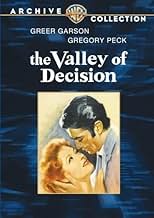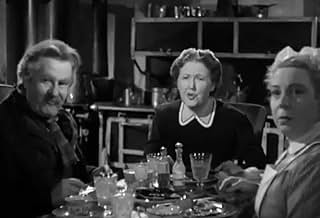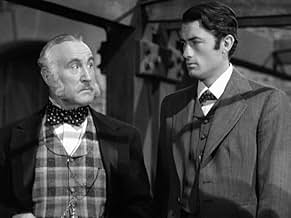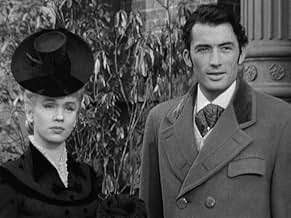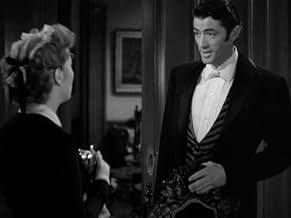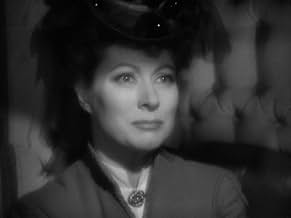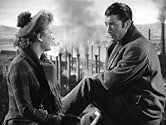AVALIAÇÃO DA IMDb
7,3/10
2,6 mil
SUA AVALIAÇÃO
Adicionar um enredo no seu idiomaAn Irish maid falls for the son of her wealthy boss, though their disapproving fathers and a bitter strike at the steel mill complicate matters.An Irish maid falls for the son of her wealthy boss, though their disapproving fathers and a bitter strike at the steel mill complicate matters.An Irish maid falls for the son of her wealthy boss, though their disapproving fathers and a bitter strike at the steel mill complicate matters.
- Direção
- Roteiristas
- Artistas
- Indicado a 2 Oscars
- 4 vitórias e 2 indicações no total
- Direção
- Roteiristas
- Elenco e equipe completos
- Produção, bilheteria e muito mais no IMDbPro
Avaliações em destaque
I sat in awe of this film one chilly October evening in 2001 and I remember the thought going through my mind, "how is it that I've never seen this before?" I adore Greer Garson and her performance as Mary Raffery took my breath away and Gregory Peck has always been at the top of my list of talented and handsome actors. This movie is full of anxiety ridden romance and dramatic acting at its best. With a superb cast and a wonderful story line, I'd recommend this movie to anyone that feels they're able to truly recognize greatness.
This is a fine historical-era drama, about a Pennsylvania mill-town. In this absorbing drama, which is only one book of a monumental Catholic work by Marcia Davenport, Greer Garson plays a pretty and bright young woman who takes a job in the lavish home of a Pittsburgh steel magnate, played honestly and strongly veteran actor Donald Crisp. Gregory Peck plays one of his sons, the serious one, who is devoted to his father's mill and who works alongside some of the mill workers, including his friend Preston Foster. The father has two other sons--Dan Duryea, who is more desirous of having money rather than of working; and Marshall Thompson, who has turned to alcohol in his unhappiness...There is also a daughter played by the fine actress Marsha Hunt, perhaps one of her best performances. Gladys Cooper plays the matriarch of the family, who befriends Garson, and leaves her her shares in the mill. Garson's father, played with skill by Lionel Barrymore, is an embittered man, who lost the use of his legs in an accident in the mill, and did not want his daughter working for the owners. It is he who begets violence that has tragic consequences. Jessica Tandy plays Peck's wife, a bitter woman; Peck should have married Garsop all along, of course; but the climax of the film is the troubles at the steel mill that are started by the angry workers and the consequences on all concerned of this violent crisis action. There are many finely-developed characters in this long film, but I sense also a fair sense of fatality about the events, intended by the author, against which the attraction of persons, characters and dispositions of Peck and Garson are played, like two rays of sunlight illuminating a dark jungle's zone. Thiis attractive B/W production was directed by Tay Garnett. Marcia Davenport long novel was adapted to the screen by fine scenarist Sonya Levien and John Meehan. The cinematography for the film was the work of Joseph Ruttenberg and Herbert Stothart composed the dramatic score. When I say that the art direction was done by Cedric Gibbons with Paul Groesse, the set decorations by Edwin B. Willis and the costume designs by Irene, I have accounted for the film's very-opulent and vivid production values. In the cast apart from the principals already mentioned, one can see Barbara Everest, Geraldine Wall, Eveline Dockson, John Warburton, Rusell Hicks, Mary Lord, Arthur Shields, young Dean Stockwell, Maru Courier, Lumsden Hare, Connie Golchrist and Anna Q. Nilsson. This is always an attractive and a carefully-considered production, which occasionally seems to me to lack warmth; with a great script, everyone concerned could perhaps have produced a masterpiece. With the one they had, the talents involved produced a memorable adventure that rises on occasion to first-rate dramatic heights. Not to be missed, perhaps. I would love to see it redone, with another fine cast; more than melodrama, it has I believe as a writer, an important dramatic potential.
I viewed this movie and fell in love with the story of a family who owned a Pittsburg Steel Mill. What a great movie where determination and love of the steel mills helped preserve and shape the USA into a world power. The portrayal of steel workers along side the upper class was particularly interesting, because the owners are showed as observers and not really part of the sweat and steel, until Gregory Peck gives an awe inspiring speech about what its like working on the ground floor of a steel mill. I particularly enjoyed Gregory and Greer's on screen relationship and the difficulty of romantic relationships between two different classes. I thoroughly enjoyed this movie.
If you're interested in this movie, and others like it, and if you've gotten so far as to be reading this review, you probably already know the plot, so I don't need to get into all that. No, my purpose here, and in most of my other reviews, is to take a look at other aspects of the movie, such as acting, writing, etc.
So, here goes: "Valley of Decision" is overall a touching, well done movie. One of the best things is certainly the star power contained in the cast. We have the lovely Greer Garson, who really does a nice job in this. Gregory Peck is one of my favorite leading men, and what always impressed me is how quickly he rose to the top in Hollywood. "Valley of Decision" was only his third film, yet at only 29 years old he was already established as a lead. Donald Crisp, who seems to be in almost everything, is a reliable character actor as well. And now let me say a brief word in defense of Lionel Barrymore. I've noticed that a couple other reviews on here are saying that he ruins the film with his "ham overacting". Well, I'm sorry, but Lionel Barrymore was an acting genius, and maybe he was a ham, but in the acting world I think that's more often a good thing than bad. Let's face it: his role in this was not supposed to be subtle, and his character was not supposed to be likeable. Yes, perhaps his other film villains, such as Mr. Potter from "It's a Wonderful Life" were more poised and shrewd, but that was not called for in this. He played an embittered man who held on to a grudge for way too long, and it had terrible consequences. If Lionel Barrymore carried out his role the way he saw fit as the one playing the part, then so be it. Don't slam him for it. He didn't wreck the film, or his own portrayal of the character; he may have chosen to overplay the role, but I think his bitterness ended up being very effective, and his hatred convincingly disturbing.
Now that I'm finished with that, allow me to talk about the movie as a whole. It's very good, and I would definitely recommend it. It's a sweet, old-fashioned, uncomplicated love story, and I wish they still made movies like this today. What a shame that the majority of romances (and most other genres, come to think of it) made in this day and age are full of bad language and sex and/or nudity in every other scene. I have a true fondness and respect for the good old days when movies were movies!
So, here goes: "Valley of Decision" is overall a touching, well done movie. One of the best things is certainly the star power contained in the cast. We have the lovely Greer Garson, who really does a nice job in this. Gregory Peck is one of my favorite leading men, and what always impressed me is how quickly he rose to the top in Hollywood. "Valley of Decision" was only his third film, yet at only 29 years old he was already established as a lead. Donald Crisp, who seems to be in almost everything, is a reliable character actor as well. And now let me say a brief word in defense of Lionel Barrymore. I've noticed that a couple other reviews on here are saying that he ruins the film with his "ham overacting". Well, I'm sorry, but Lionel Barrymore was an acting genius, and maybe he was a ham, but in the acting world I think that's more often a good thing than bad. Let's face it: his role in this was not supposed to be subtle, and his character was not supposed to be likeable. Yes, perhaps his other film villains, such as Mr. Potter from "It's a Wonderful Life" were more poised and shrewd, but that was not called for in this. He played an embittered man who held on to a grudge for way too long, and it had terrible consequences. If Lionel Barrymore carried out his role the way he saw fit as the one playing the part, then so be it. Don't slam him for it. He didn't wreck the film, or his own portrayal of the character; he may have chosen to overplay the role, but I think his bitterness ended up being very effective, and his hatred convincingly disturbing.
Now that I'm finished with that, allow me to talk about the movie as a whole. It's very good, and I would definitely recommend it. It's a sweet, old-fashioned, uncomplicated love story, and I wish they still made movies like this today. What a shame that the majority of romances (and most other genres, come to think of it) made in this day and age are full of bad language and sex and/or nudity in every other scene. I have a true fondness and respect for the good old days when movies were movies!
Very interesting and entertaining poor-girl meets rich-boy tale of romance between a wealthy Pittsburgh steel mill owner(Gregory Peck) and a beautiful housemaid(Greer Garson). This circa 1870 drama is directed by Tay Garnett and based on a Marcia Davenport novel. A star studded cast makes this a prominent classic. Joining Peck and Garson are Donald Crisp, Lionel Barrymore, Dan Duryea, Marsha Hunt, Marshall Thompson, Preston Foster, Jessica Tandy and Reginald Owen. This movie is deserving of your time. Wholesome and enjoyable watching.
Você sabia?
- CuriosidadesFeature film debut of Dean Stockwell.
- Erros de gravaçãoWhen Mary is leaving for Europe after stopping at her father's house, she rushes away without her satchel containing all her belongings. She boards the carriage without it, and Jim, who accompanies her outside, is not carrying it either.
People sometimes do forget to take their bags when leaving for a trip. Also, as Constance wanted Mary to come with her, and she and her husband are quite wealthy, they would simply buy Mary a contemporary continental wardrobe.
- Citações
Paul Scott: [Mary is upset over her father's stubbornness and begins crying. Paul leads her to a bluff overlooking Pittsburgh's steel mills] You can see all of Pittsburgh from here, but Pittsburgh can't see you. Why don't you sit down and cry it out?
- ConexõesReferenced in Sombras que Vivem (1954)
- Trilhas sonorasMolly Baun
(uncredited)
Traditional Irish Ballad
Sung a cappella by Greer Garson
Also played a bit in the score
Principais escolhas
Faça login para avaliar e ver a lista de recomendações personalizadas
- How long is The Valley of Decision?Fornecido pela Alexa
Detalhes
Bilheteria
- Orçamento
- US$ 2.160.000 (estimativa)
- Tempo de duração
- 1 h 59 min(119 min)
- Cor
- Proporção
- 1.33 : 1
Contribua para esta página
Sugerir uma alteração ou adicionar conteúdo ausente


